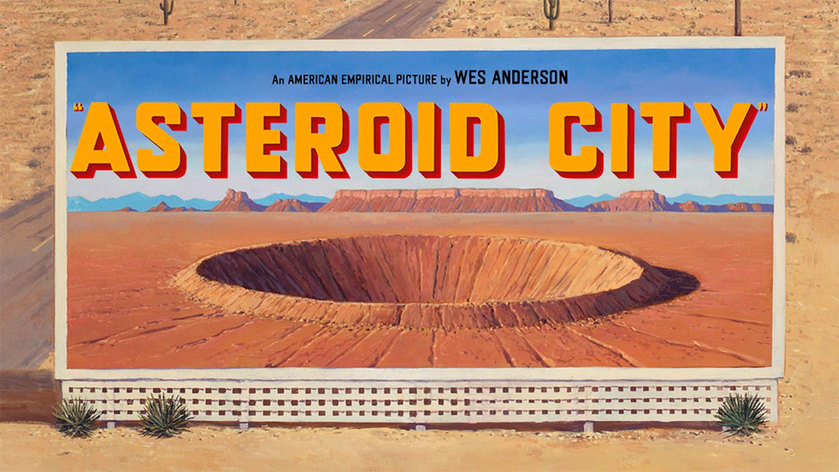My first thought after watching Asteroid City, the new film from Wes Anderson, is that it’s hopelessly convoluted and probably not worth trying to unpack. On the surface, it’s about a grieving father struggling to be a father after the death of his wife. But that’s just scene dressing (literally, as the main story is framed as a play) for the story of a playwright dealing with the demise of his marriage.
Yes, it’s Wes Anderson’s take on the multiverse.
Much has been made of the quarantine theme. In the play, the universe which makes up the majority of the movie, the characters arrive in Asteroid City for a youth science competition. At the midpoint (when screenplays usually have the hero suffer a tremendous setback) an alien arrives and steals the city’s eponymous asteroid, forcing everyone into lockdown. There, in isolation, they find love, mend relationships, grieve their losses, and find connection. Is Anderson suggesting that the artist’s life is also one of isolation with imaginary characters, who grow more meaningful to him than the real people in his life?
No clue. But I suppose that’s one interpretation.
Then there’s the chanted mantra, “You can’t wake up if you don’t fall asleep.” To me, it feels like dorm room philosophy, which sounds brilliant at 3am with your buddies and meaningless when you stop to consider it in the light of day. Is the idea that we must surrender ourselves in order to arrive at enlightenment? Well, that’s untrue at best. It’s demonic at worst. Maybe he’s just saying there’s a time to all seasons. In the song over the end credits we hear, “There is some countin’ money and there’s some counting sheep / Oh you can’t wake up if you don’t fall asleep.”
I think it’s a pretentious paradox, knowingly meaningless and designed to make the speaker sound smart.
But let’s put on our tin foil hats for a moment.
Aliens are in the news again. We just came out of lockdowns. There’s the idea of “Revelation of the Method,” which says the elites seed ideas into pop culture before implementing them on the populace. If they tell us what they’re going to do before they do it they remain karmically pure. It’s why The Simpsons is always predicting the future. The writers don’t know the future. They’re subtly telling us what will happen. Perhaps Wes Anderson is telling us that soon aliens will cause the government to put us in another lockdown, and as our society sleeps we’ll find enlightenment.
Illuminati confirmed!
At the end of the movie the alien returns the asteroid and the humans have found hope and purpose in life. But the playwright, who contrived all these events, is dead. Maybe instead this a warning to the elites. Don’t meddle in the spiritual realm or you’ll end up dead. Or perhaps it’s worthy sacrifice, since every writer believes that he finds immortality as long as his work is remembered.
Beats me.
Let’s not forget waking up when we fall asleep. What happens when we dream? We feel like we’re in another reality. The way the movie slips between realities, the play within a documentary about the play, I think Anderson is expressing the idea that when we sleep we wake up in another realm. Dorothy bumped her head, fell asleep, and woke up in Oz, which was very real. More real than reality. Asteroid City even draws inspiration from The Wizard of Oz, showing the “real” world in black and white, and the play in color.
The Wizard of Oz, of course, was used for government funded brainwashing programs.
As a theater nerd, I appreciated how the three little girls are Weird Sisters and that the cowboy band functions as a sort of Greek chorus. As a Christian, I found it interesting that the Christian character was ill equipped to deal with the arrival of extraterrestrial life. Something to consider as our world gets weirder and weirder. As a conspiracy theorist, I found plenty to theorize about.
Visually, I loved the movie.
Where Anderson excels is in creating a longing for a time that never existed. Was the 50’s portrayed in the movie anything like what my dad experienced? Not really. But kinda? It was a different time, which my generation can only experience now through candy colored remnants of pop culture. And that’s where this movie lives. I’ll happily watch Asteroid City again as a piece of visual art. But if there’s any meaning here beyond pretense, most of it simply isn’t true and what is can be found more honestly elsewhere.

























